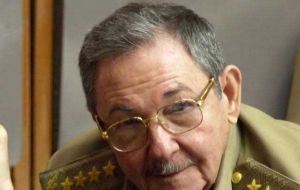MercoPress. South Atlantic News Agency
Raul's Cuba invites UN envoy and quietly frees political prisoners
 Raul Castro stamps his own style to diplomacy and bussines relations
Raul Castro stamps his own style to diplomacy and bussines relations Cuba's ambassador to the Unite Nations Juan Antonio Fernández Palacios said Friday that the country is ready to resume co-operation with the UN on human rights, given the changes that have taken place in the organization.
Speaking to the foreign press ambassador Fernandez stressed the importance of the new Human Rights Council created in 2006, as well as the withdrawal of the UN Special Envoy to Cuba, Christine Chanet last June. "The council is a body that will allow us to explore new paths for progress, outside the boundaries of the old human rights commission," said Fernandez, adding that the changes have opened the door to Cuba's participation in the UN's human rights mechanisms. As a first step, the Cuban government, now firmly under control of Fidel Castro's brother Raul has invited Special Rapporteur on the right to food, Jean Ziegler, to visit the island to report to the council on Cuba's current situation and the measures taken by the government to improve it. Ziegler is slated to begin his visit on the 28th October and stay until 6th November. Fernandez pointed out that Cuba had ceased to cooperate with the previous human rights council on the grounds that the UN's human rights organs had become politicized. This is not however the first time Cuba has collaborated with the UN on human rights. In 1999, Special Rapporteurs on violence against women and on the use of mercenaries were invited to the island. Nevertheless the Cuba under Raul Castro seems to be sending some clear messages: when prominent Cuban human rights advocate Francisco Chaviano was released earlier this month after 13 years in prison, he joined the growing list of political dissidents set free in the year since Fidel Castro was sidelined by poor health July 2006. The steady fall in Cuba's political prisoner population since Raúl Castro took the reins of power is leading some Cuba experts to conclude that some kind of new day is dawning on the Caribbean communist island. The slow and cautious release of political prisoners seems to be different from the periodic peaks and valleys over recent decades. The Havana-based Commission for Human Rights and National Reconciliation, an illegal but tolerated nongovernmental organization, reports a fall of more than 20% in the number of political prisoners over a year ago. The total, according to the group, stood at 246 as of June 30, down from 316 in 2006. The number still represents by far the largest incarceration of prisoners of conscience of any country in the Western Hemisphere and one of the highest per capita rates anywhere in the world. But others analysts point to the fact that there has been a tightening of access to outside information sources such as cutting off private Internet access or confiscating satellite dishes. "I don't see a big change in the human rights situation, but I don't see it worsening either," says Uva de Aragón, associate director of the Cuba Research Institute at Florida International University. "Like most things in Cuba, it's in a waiting mode". This new situation has been supported by an improved economic situation: oil-rich Venezuela under Hugo Chávez has replaced the Soviet Union as the country's benefactor, Cuba is doing billions of dollars in trade with other countries and the island is set to explore vast deposits of oil and natural gas off its shoreline. China, India and other countries are ready to associate and explore the 5 billion to 10 billion barrels of oil and 9 trillion cubic feet of natural gas that is believed to exist in the waters off Havana. Despite the 40-year-old U.S. trade embargo with Cuba, the country has evolved capita-list-style businesses and enterprises from the bed-and-breakfast cooperative operators to the 2.3 billion US dollars in annual sales of nickel the country makes to Canada. The Italian press reported this week that Raul Castro visited Italy for a week in July to inspect an 80 hectares state of the art golf course in the north of the country, similar to one projected by the same company in an exclusive Cuban resort area. After an hour's tour in helicopter, Raul Castro is quoted saying "this is magnificent, congratulations". He later flew to Sicily to visit the family of his son in law, according to the Italian press.




Top Comments
Disclaimer & comment rulesCommenting for this story is now closed.
If you have a Facebook account, become a fan and comment on our Facebook Page!